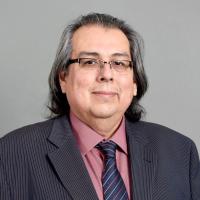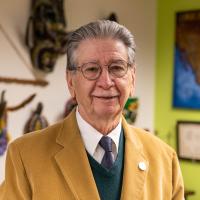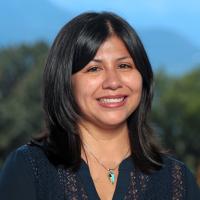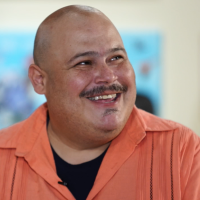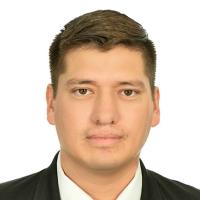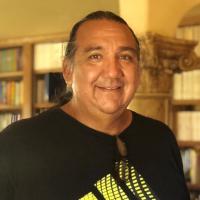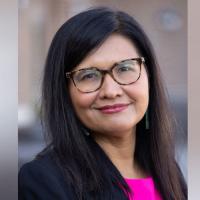Who are we?
Staff
David Martínez (Akimel O'odham/Hia Ced O'odham/Mexican), Professor of American Indian Studies and Transborder Studies (joint appointment) and Director of the Institute for Transborder Indigenous Nations, is the author of Dakota Philosopher: Charles Eastman and American Indian Thought (2009), editor of The American Indian Intellectual Tradition: An Anthology of Writings from 1772 to 1972 (2011), author of Life of the Indigenous Mind: Vine Deloria Jr and the Birth of the Red Power Movement (2019), and author of My Heart Is Bound Up With Them: How Carlos Montezuma Became the Voice of a Generation (2023). As a teacher and scholar, his areas of concentration are Indigenous intellectual history; O'odham culture, history, and politics; Transborder Indigenous nations; and, Indigenous art history and aesthetics. Currently, Martínez is working on his fifth book, titled Elder Brother's Forgotten People: How the Hia-Ced O'odham Survived an Epidemic to Claim a Place in Arizona's Transborder History. Contact David Martínez
Experts
Carlos G. Vélez-Ibáñez received a Ph.D. in Anthropology, USCD (1975). Intellectual interests are broadly comparative and applied and publications include 12 books in English and Spanish with three more translated into Spanish as well many articles and chapters. He held professorships in anthropology at UCLA and the University of Arizona where in 1982, he founded the Bureau of Applied Research in Anthropology. He became dean in 1994 at the University of California, Riverside of the College of Humanities, Arts and Social Sciences and founded the Ernest Galarza Applied Research Center, and in 2011 founded the School of Transborder Studies at Arizona State University. Presently, he is Regents Professor of the School of Transborder Studies and School of Human Evolution and Social Change, and Motorola Presidential Professor of Neighborhood Revitalization, at Arizona State University. Contact Carlos G. Vélez-Ibáñez.
Christina Leza is a linguistic anthropologist and Yoeme-Chicana activist scholar whose research interests include Indigenous peoples of the Americas, Indigenous rights, discourse and identity, racial and ethnic discourses, grassroots activism, cognitive anthropology, and the U.S.-Mexico border. Her most recent research has focused on Indigenous activist responses to U.S.-Mexico border enforcement. She has also examined broader discourse patterns among indigenous grassroots activists in the U.S. and Latin America. Her publications include Divided Peoples: Policy, Activism and Indigenous Identities on the U.S.-Mexico Border (University of Arizona Press), and "Hip Hop is Resistance: Indigeneity on the U.S.-Mexico Border" in the edited volume Music and Modernity among First Peoples of North America (Wesleyan University Press). Contact Christina Leza.
Dr. Roberto D. Hernández (Xicano) is an associate professor of Chicana and Chicano Studies at San Diego State University and an actively engaged, community-based researcher, scholar, teacher and writer. Born in Mexico, but raised in San Ysidro, within blocks of the busiest port of entry in the world, the U-S///Mexico border has figured prominently in his intellectual, political and professional development and commitments. He earned a Chicana/o Studies Honors BA (with an emphasis in Political Theory), as well as Masters and PhD in Comparative Ethnic Studies (Black, Native and Chicana/o Studies) from the University of California, Berkeley, where he was also a Researcher with the Center for Latino Policy Research and a Research Fellow at the Institute for the Study of Social Change. He was previously a Visiting Researcher in the Center for Black Studies Research and the Chicana/o Studies Institute at UC Santa Barbara, where he taught in both Chicana/o Studies and Black Studies. Dr. Hernandez also coordinates several advanced international research institutes for junior scholars: Decolonizing Knowledge and Power (in Barcelona), Critical Muslim Studies (Granada), and Latin American Decolonial and Feminist Thought (Mexico City). Contact Dr. Roberto D. Hernández.
Omar Navarrete Martínez is a producer and filmmaker. He participates in Solidaridad Comca'ac and a founding member of Icoos Hicoiit A. C., this last group arises at the request of the elders of the Comca'ac Community of Punta Chueca, Sonora, Mexico, to rescue their ancestral wisdom, dances, songs and oral history through video-documentary. Through the Preservation of Memories of the Sea and Desert website, it seeks to disseminate these Comca'ac traditions. He has co-written, co-directed and co-produced indigenous cultural rescue and preservation documentaries. Winner of various state and national calls in Mexico. He has a master's degree in Economic Integration at UNISON and a master's degree in Innovation for business development at ITESM. He is currently pursuing his PhD in Regional Development at CIAD A.C. and his line of research is focused on new information and communications technologies, cross-border identity and economy of indigenous communities in the Sonora-Arizona region. Contact Omar Navarrete Martínez.
Omar Navarrete Martínez es un productor y cineasta. Participa en Solidaridad Comca´ac y miembro fundador de Icoos Hicoiit A. C., este último grupo surge a petición de los abuelos de la Comunidad Comca´ac de Punta Chueca, Sonora, México. para el rescate de su sabiduría ancestral, danzas, cantos e historia oral mediante el video-documental. A través del sitio Web Preservación de Memorias del Mar y del Desierto, busca la difusión de dichas tradiciones Comca´ac. Ha coescrito, codirigido y coproducido documentales de rescate y preservación cultural indígena. Ganador de diversas convocatorias estatales y nacionales en México. Tiene maestría en Integración económica en la UNISON y maestría en Innovación para el desarrollo empresarial en el ITESM, actualmente realiza su doctorado de Desarrollo Regional en el CIAD A.C. y su línea de investigación esta enfocada en nuevas tecnologías de información y comunicaciones, identidad transfronteriza y economía de comunidades indígenas de la región Sonora-Arizona.
Daniel Golding graduated Cum Laude from San Francisco State University receiving a BA in Film Production and a minor in American Indian Studies. He started Hokan Media Productions in 1997 as a means to produce social issue documentary and narrative films. His films have been screened both nationally and internationally. Golding is also a traditional singer and is involved in a master apprentice language program with his uncle. He is an enrolled member of the Quechan Indian Nation located in Winterhaven, CA and is currently based in Yuma Arizona. Contact or learn more about Golding’s film work.
M. Bianet Castellanos is Distinguished McKnight University Professor of American Studies and the Director of the Institute for Advanced Study. Her book, Indigenous Dispossession: Housing and Maya Indebtedness in Mexico (Stanford University Press 2021), analyzes how Maya families make sense of the cultural, political, and legal ramifications of neoliberal housing policies that privilege mortgage finance over land redistribution. It was awarded the 2022 Gregory Bateson Book Prize, 2022 Arthur J. Rubel Book Prize, and 2021 Edward M. Bruner Book Prize, and was a finalist for the 2023 Society for Economic Anthropology Book Prize.
Her other works include A Return to Servitude: Maya Migration and the Tourist Trade in Cancún (University of Minnesota Press 2010), Comparative Indigeneities of the Américas: Toward a Hemispheric Approach, which she co-edited with Lourdes Gutiérrez Nájera and Arturo Aldama (University of Arizona Press 2012), and the anthology Detours: Travel and the Ethics of Research in the Global South (University of Arizona Press 2019). She edited a forum on settler colonialism in Latin America for America Quarterly and has contributed to the Radical Housing Journal, Latino Studies, NACLA, Aztlán, Journal of Latin American and Caribbean Anthropology, Frontiers, among others. She serves on the editorial boards of American Quarterly, Cultural Anthropology, American Ethnologist, Aztlán, Open Rivers, and Settler Colonial Studies.
She recently co-edited the special double issue Unsettling Global Midwests for American Studies Journal with Christopher Perreira, Thomas Sarmiento, and Jessica Lopez Lyman. Her new research examines settler colonialism in western Mexico and the cultural politics of Indigenous and Afro-Mexican migrations and displacements in this region.
She is a member of the Critical Latinx Indigeneities Working Group, the INRS Dialog, and Mexico’s Sistema Nacional de Investigadores. She teaches courses on Indigenous urbanisms; immigration; tourism; women, rage, and politics; American politics and popular culture; and the US-Mexico border. Contact M. Bianet Castellanos.

Felicity Amaya Schaeffer is Chair of the Critical Race and Ethnic Studies Department and Professor of Feminist Studies at UCSC. Her research and teaching interests include: Latinx and Indigenous decolonial studies, migration, and border studies and feminist and critical race STS (Science and Technology Studies). She has written two monographs: Love and Empire: Cybermarriage and Citizenship Across the Americas (2013) and Unsettled Borders: The Militarized Surveillance on Sacred Indigenous Land (2021). She also co-edited the Anthology, Precarity & Belonging: Labor, Migration, and Noncitizenship (2021). In December of 2022, she participated as a UN Expert Seminar Participant on the Impact of Militarization on the Rights of Indigenous Peoples. She is currently writing a co-authored book with Professor Neda Atanasoski called, “Planetary Commons,” that traces the expansion of property and sovereignty through the International race to extract and foster life in zones currently uninhabited by humans, and especially Indigenous peoples, zones considered “non-life”: outer space voids, planets and asteroids; the seabed floor, virtual reality, and Indigenous desert lands. We trace the re-workings of life and habitability through Astrocolonialism of the Americas, international property law, colonial and NASA biological experiments, and debates about the reproduction of life in the design of space settlements. We counter these apocalyptic industries by centering Indigenous cosmologies of earth and sky that speak back to space through the remembering and imagining of otherworldly futures. Contact Felicity Amaya-Schaeffer.

Rochelle Morgan-Verdin is a proud citizen of the United Houma Nation. She holds a master's in International Law and Human Rights from the United Nations-mandated University for Peace, as well as a bachelor's in Latin American and Caribbean Studies from Emory University. Currently, Rochelle serves as Policy Lead for International Affairs at the National Congress of American Indians, addressing critical issues impacting Indigenous Peoples worldwide. As Policy Lead for International Affair, Rochelle staffs NCAI's Tribal Border Task Force, Peyote Task Force, Southwest Regional Caucus, and International Committee. She currently serves as the American Bird Conservancy's Fellow for the Cross-Border Stewardship in the Sonoran Desert Community Engagement Program.
Contact Rochelle Morgan-Verdin.

Sherally Munshi earned her JD from Harvard Law School and a PhD in Literature from Columbia University. Before joining the law faculty at Georgetown, Prof Munshi was a Perkins/LAPA Fellow at Princeton University. Her areas of scholarly interests include property law, immigration law, and critical legal theory. Her writing has appeared in the Yale Journal of Law &Humanities, the American Journal of Comparative Law, and Harper’s. Among her impressive publications is her thought-provoking article “Unsettling the Border,” which appeared in a 2021 issue of the UCLA Law Review. Munshi is also the author of “Dispossession: An American Property Law Tradition,” Georgetown Law Journal (2022) and “Immigration, Imperialism, and the
Legacies of Indian Exclusion,” Yale Journal of Law and Humanities (2016).

Dr. Carmen Martinez Novo received a Ph.D. in Anthropology from the New School for Social Research, New York. She has taught at Northeastern University, The Latin American Faculty for the Social Sciences (FLACSO) in Quito, Ecuador, and the University of Kentucky. She has been a Visiting Professor at The Johns Hopkins University, Grinnell College, Universidad Nacional de Colombia, Universidad Iberoamericana, Mexico D.F., Universitat de Lleida in Spain, and Universidad Federal do Ceará in Fortaleza, Brazil. She is a Fulbright Specialist for the period 2024-2025. She has received grants from the American Council of Learned Societies (2017-2018), the Wenner-Gren Foundation for Anthropological Research, and the MacArthur Foundation, among others. She has done research in Ecuador and at the Mexico-U.S. border. Her research focuses on indigenous identities, politics and rights. She has also studied racism, paternalism, the anthropology of the state and Latin American elites. She is currently involved in a project on memory and everyday life in the early years of the Franco dictatorship.

María Josefina Saldaña-Portillo is a professor in the Department of Social & Cultural Analysis Department & the Center for Latin American and Caribbean Studies at NYU. Her book, Indian Given: Racial Geographies across Mexico and the United States (Duke UP 2016), received the 2019 Casa de Las Americans Literary Prize in Latino Studies; the 2017 ASA John Hope Franklin Book Prize; and the 2017 NACCS Book Award. With thirty articles, in English and Spanish, on revolution, subaltern politics, indigenous peoples, racial formation, migration, narco-economies, and Latin American and Latinx cultural studies, her most recent include “Indians Have Always Been Modern: Roma, The Settler Colonial Paradigm & Latinx Temporality” (Aztlán, Fall 2020), which rethinks decolonialism from a Latin American perspective; and “The Violence of Citizenship in the Making of Refugees: The U.S. and Central America,” which explores the integral role gendered labor and violence play in the drug economy (Social Text, Fall 2019). She is the Chairwoman of the Coalición Mexicana, an immigrants’ rights organization, and an expert witness for Central American asylum cases with legal aid agencies internationally.

Osvaldo Ruiz was born in San Diego, California - raised in the South Bay area and in Tijuana, Mexico. As a son of immigrant parents, the border and immigration policies impacted his life directly, making him passionate about migrant rights and their communities. In 2015, Osvaldo began as a volunteer with Border Angels, helping establish public events and programs within the organization. Now, Osvaldo leads the Water Drop and Caravan of Love programs.
For more about Border Angels visit here.
